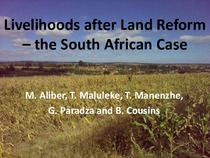| dc.contributor.author | Aliber, Michael | |
| dc.contributor.author | Maluleke, T | |
| dc.contributor.author | Manenzhe, T | |
| dc.contributor.author | Paradza, Gaynor | |
| dc.contributor.author | Cousins, Ben | |
| dc.date.accessioned | 2019-04-15T11:55:26Z | |
| dc.date.available | 2019-04-15T11:55:26Z | |
| dc.date.issued | 2012 | |
| dc.identifier.citation | Aliber, M., Maluleke, T., Manenzhe, T. Paradza, G. & Cousins, B. nd. Livelihoods after land reform: The South African Case. [Power Point Presentation] | en_US |
| dc.identifier.uri | http://hdl.handle.net/10566/4616 | |
| dc.description.abstract | SA’s land reform regarded as a failure
– economic objectives – the spectre of ‘failed projects’
– changing the racial pattern of land ownership – too slow
• No consensus as to why, or what to do
• Even so, ambitious if vague promises
• Dominant ethos = modernisation
“Another focus area [of the Department] will be skills transfer, to promote the transfer of skills from white commercial farmers to black subsistence farmers” (Joemat-Pettersson, 2010) | en_US |
| dc.language.iso | en | en_US |
| dc.publisher | Institute for Poverty Land and Agrarian Studies (PLAAS) | en_US |
| dc.subject | South Africa | en_US |
| dc.subject | Livelihoods | en_US |
| dc.subject | Land reform | en_US |
| dc.title | Livelihoods after land reform: The South African case | en_US |
| dc.type | Presentation | en_US |

